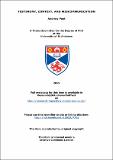Files in this item
Testimony, context, and miscommunication.
Item metadata
| dc.contributor.advisor | Cappelen, Herman | |
| dc.contributor.author | Peet, Andrew | |
| dc.coverage.spatial | 169 | en_US |
| dc.date.accessioned | 2015-10-28T12:50:54Z | |
| dc.date.available | 2015-10-28T12:50:54Z | |
| dc.date.issued | 2015-11-30 | |
| dc.identifier | uk.bl.ethos.668834 | |
| dc.identifier.uri | https://hdl.handle.net/10023/7705 | |
| dc.description.abstract | This thesis integrates the epistemology of testimony with work on the epistemology, psychology, and metaphysics of language. Epistemologists of testimony typically ask what conditions must be met for an agent to gain testimonial justification or knowledge that p given that p has been asserted, and this assertion has been understood. Questions regarding the audience's ability to grasp communicated contents are largely ignored. This is a mistake. Work in the philosophy of language (and related areas) suggests that the determination and recovery of communicated contents is far from straightforward, and can go wrong in many ways. This thesis investigates the epistemology of testimony in light of this work, with a special focus on miscommunication. The introduction provides a brief overview of some relevant work on testimony, the philosophy of language, and psychology, and argues that there is good reason to investigate the three. One obvious problem in this area is that if testimonial knowledge requires knowledge of what is said then the risk of miscommunication will block testimonial knowledge. Chapter two argues that testimonial knowledge does not require knowledge of what is said. The remaining four chapters discuss problems which do to arise from miscommunication. Chapters three and four focus on the epistemic uncertainty of communication with context sensitive terms. Chapter three argues that many beliefs formed on the basis of context sensitive testimony are unsafe and insensitive. Chapter four argues that speakers often have plausible deniability about the contents of their assertions. Chapters five and six explore types of miscommunication which arise as a result of background mental states affecting our linguistic understanding. Chapter five explores the social/ethical consequences of this, arguing that certain groups are disproportionately subject to harmful misinterpretation. Chapter six argues that testimonial anti-reductionists make the wrong predictions about a range of cases of cognitive penetration. | en_US |
| dc.language.iso | en | en_US |
| dc.publisher | University of St Andrews | |
| dc.rights | Creative Commons Attribution 4.0 International | |
| dc.rights.uri | http://creativecommons.org/licenses/by/4.0/ | |
| dc.subject | Testimony | en_US |
| dc.subject | Miscommunication | en_US |
| dc.subject | Epistemology | en_US |
| dc.subject | Context sensitivity | en_US |
| dc.subject.lcc | BD238.T47P4 | |
| dc.subject.lcsh | Testimony (Theory of knowledge) | en_US |
| dc.subject.lcsh | Context (Linguistics) | en_US |
| dc.subject.lcsh | Miscommunication | en_US |
| dc.title | Testimony, context, and miscommunication. | en_US |
| dc.type | Thesis | en_US |
| dc.contributor.sponsor | Arts and Humanities Research Council (AHRC) | en_US |
| dc.type.qualificationlevel | Doctoral | en_US |
| dc.type.qualificationname | PhD Doctor of Philosophy | en_US |
| dc.publisher.institution | The University of St Andrews | en_US |
This item appears in the following Collection(s)
Except where otherwise noted within the work, this item's licence for re-use is described as Creative Commons Attribution 4.0 International
Items in the St Andrews Research Repository are protected by copyright, with all rights reserved, unless otherwise indicated.


